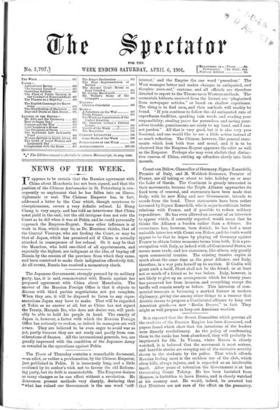The Times of Thursday contains a remarkable document, —an edict,
or rather a proclamation, by the Chinese Emperor, just published in Pekin. It is immensely long, and a little confused by its author's wish not to favour the old Reform- ing party, but its drift is unmistakable. The Emperor desires as many changes as he can effect without a revolution. He denounces present methods very sharply, declaring that "what has ruined our Government is the one word 'self-
interest,' and the Empire the one word precedent.' The West manages better and makes changes in antiquated, and therefore worn-out," customs, and all officials are therefore directed to report to the Throne upon Western methods. The memorials hitherto received from the literati are "plagiarised from newspaper articles," or based on shallow experience. The thing is to find men, and then methods will readily be found. "If you continue to follow the old antiquated ruts of superfluous tradition, speaking vain words and evading your responsibility, stealing peace for yourselves and saving your- selves trouble, punishments are ready to my hand, and I can- not pardon." All that is very good, but it is also very pro- fessional, and one would like to see a little action instead of so much reflection. The Chinese, however, like general state- ments which look both true and moral, and it is to be observed that the Empress-Regent approves the edict as well as the Emperor. Perhaps she may even abolish that distinc- tive custom of China, cutting up offenders slowly into little morsels.






































